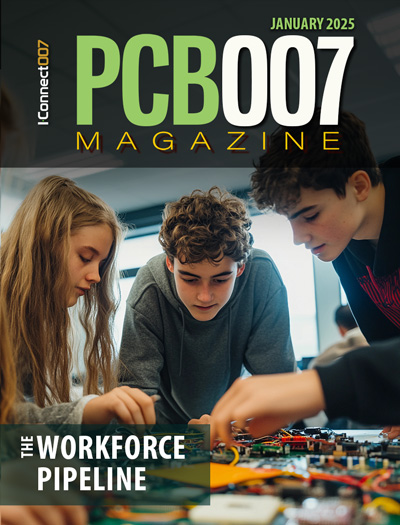-

- News
- Books
Featured Books
- pcb007 Magazine
Latest Issues
Current Issue
It's Show Time!
In this month’s issue of PCB007 Magazine we reimagine the possibilities featuring stories all about IPC APEX EXPO 2025—covering what to look forward to, and what you don’t want to miss.

Fueling the Workforce Pipeline
We take a hard look at fueling the workforce pipeline, specifically at the early introduction of manufacturing concepts and business to young people in this issue of PCB007 Magazine.

Inner Layer Precision & Yields
In this issue, we examine the critical nature of building precisions into your inner layers and assessing their pass/fail status as early as possible. Whether it’s using automation to cut down on handling issues, identifying defects earlier, or replacing an old line...
- Articles
- Columns
Search Console
- Links
- Media kit
||| MENU - pcb007 Magazine
NASA Doubles Down, Advances 6 Innovative Tech Concepts to New Phase
May 3, 2024 | NASAEstimated reading time: 1 minute
One of the ‘science fiction-like’ concepts — for a lunar railway system to provide payload transport on the Moon — is being developed at NASA’s Jet Propulsion Laboratory.
NASA’s Innovative Advanced Concepts program (NIAC) has selected six visionary concept studies for additional funding and development. Each study has already completed the initial NIAC phase, showing their futuristic ideas — like a lunar railway system and fluid-based telescopes — may provide fresh perspectives and approaches as NASA explores the unknown in space.
The NIAC Phase II conceptual studies will receive up to $600,000 to continue working over the next two years to address key remaining technical and budget hurdles and pave their development path forward. When Phase II is complete, these studies could advance to the final NIAC phase, earning additional funding and development consideration toward becoming a future aerospace mission.
“These diverse, science fiction-like concepts represent a fantastic class of Phase II studies,” said John Nelson, NIAC program executive at NASA Headquarters in Washington. “Our NIAC fellows never cease to amaze and inspire, and this class definitely gives NASA a lot to think about in terms of what’s possible in the future.”
Suggested Items
NASA Selects Futuristic Space Technology Concepts for Early Study
02/28/2022 | PRNewswireAn astronaut steps into a body scanner and, hours later, walks on Mars in a custom-made spacesuit, breathing oxygen that was extracted from Mars' carbon dioxide-rich atmosphere.
NASA Selects Innovative, Early-Stage Tech Concepts for Continued Study
04/09/2021 | NASA JPLNASA encourages researchers to develop and study unexpected approaches for traveling through, understanding, and exploring space. To further these goals, the agency has selected seven studies for additional funding – totaling $5 million – from the NASA Innovative Advanced Concepts (NIAC) program.
Futuristic Space Technology Concepts Selected by NASA for Initial Study
02/26/2021 | NASAFour advanced space concepts from NASA’s Jet Propulsion Laboratory have been selected to receive grants for further research and development. Early-stage research into futuristic space ideas – a lunar levitation track system, light bending lunar power system, method for making soil from asteroid material, and more – could help revolutionize NASA’s technology toolbox and pioneer new kinds of missions.
NASA Supports ‘Wild’ Ideas to Bring About New Space Tech
09/23/2019 | NASANASA has a wild side. In fact, the agency has a program named NIAC that is dedicated to nurturing visionary ideas that could transform future NASA missions with the creation of breakthroughs—radically better or entirely new aerospace concepts.
NASA Looks to the Future, Seeks Next Level Visionary Aerospace Concepts
12/11/2018 | NASANASA is looking for trailblazing ideas that could one day change what’s possible in space. The NASA Innovative Advanced Concepts (NIAC) program is seeking Phase II proposals for the continuation of Phase I research studies.


